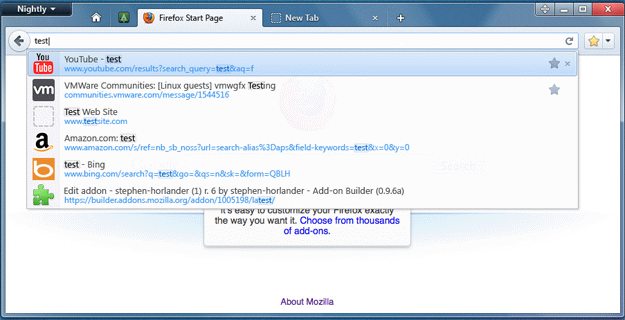Category: Upcoming
Mozilla Progresses On Silent Updates
 Mozilla is making progress on adding a silent update mechanism to Firefox, with plans to integrate the new service in Firefox 10 early next year. One of the developers working on the feature cautioned that silent update might slip, however.
Mozilla is making progress on adding a silent update mechanism to Firefox, with plans to integrate the new service in Firefox 10 early next year. One of the developers working on the feature cautioned that silent update might slip, however.
At this point, we’re not quite sure which version of Firefox this will land in…We’re working to land it as soon as is safely possible. – Ehsan Akhgari, a Firefox engineer in charge of one of the silent update components, said in a blog post last weekend.
Firefox 11 And Firefox 12 Features, Release Date
What’s new and what to expect?
As people are getting used to the faster Mozilla Firefox release cycles, we have some news about the Firefox 11 and potentially Firefox 12 web browsers.
Continue Reading
Multiple Profile Support Comes To Google Chrome
 The latest Google Chrome beta supports multiple sign ins, allowing users to have their own apps, bookmarks, and settings in the browser. This is great for people who do not want to create multiple OS profiles, or for people with separate accounts for business and personal use.
The latest Google Chrome beta supports multiple sign ins, allowing users to have their own apps, bookmarks, and settings in the browser. This is great for people who do not want to create multiple OS profiles, or for people with separate accounts for business and personal use.
Once you’ve installed the Chrome beta, you can set up multiple profiles in the options menu, under Personal Suff, by clicking “Add New User.” This automatically generates a nickname and an avatar for the user, both of which can be modified. Users can also sign into their Google accounts from the options menu to fetch Chrome settings from the cloud.
Continue Reading
Firefox 10 To Remove The “Forward” Button

Even though the final version of Firefox 10 is expected sometime in early 2012 and we are yet to see the Firefox 8 Final release, Mozilla has already cooking 10a1 nightly builds for you to play with.
Continue Reading
Opera To Release A Hybrid Web Browser
In order to end the continuous user confusion and strengthen its position in the Android market, Opera Software will ditch both Opera Mini and Opera Mobile web browsers in favor of a hybrid option, according to the company officials.
Up until now, users had to decide, go with the Opera Mini and let its servers handle web pages rendering or chose a traditional approach and install Opera Mobile, which transfers such tasks to the consumer device.
Continue Reading
Chrome Desktop Sharing Feature Coming Soon
 Called Chrome Remote Desktop, the new feature is in beta testing and lets you connect any two computers that have a Chrome browser, including Windows, Linux, Mac, and Chromebooks. The app can access all data on a remote computer and requires the person sharing access to their computer to give a code to the person who will tap into it remotely. That authentication must be done every time access is granted.
Called Chrome Remote Desktop, the new feature is in beta testing and lets you connect any two computers that have a Chrome browser, including Windows, Linux, Mac, and Chromebooks. The app can access all data on a remote computer and requires the person sharing access to their computer to give a code to the person who will tap into it remotely. That authentication must be done every time access is granted.
The company released the new cross platform extension for its Chrome browser on Friday.
Continue Reading
Mozilla To Prompt Firefox 3.6 Users To Upgrade
 Mozilla said it will begin to send Firefox 3.6 users an offer that urges them to get on the rapid release train.
Mozilla said it will begin to send Firefox 3.6 users an offer that urges them to get on the rapid release train.
It would be the first time it has offered what it calls an “advertised update” or a “major update” to people still running 2010’s Firefox 3.6.
According to Mozilla, the offer does not hint at an impending retirement of the older version.
Continue Reading
Mozilla Urges Users To Disable McAfee Plugin
 ScriptScan ships with McAfee’s VirusScan antivirus program. It’s designed to keep Web surfers safe by scanning for any malicious scripting code that might be running in the browser. According to Mozilla, however, it has an unintended side effect: It can cause Firefox to crash…a lot.
ScriptScan ships with McAfee’s VirusScan antivirus program. It’s designed to keep Web surfers safe by scanning for any malicious scripting code that might be running in the browser. According to Mozilla, however, it has an unintended side effect: It can cause Firefox to crash…a lot.
Mozilla said that the extension “causes a high volume of crashes,” and is “strongly encouraging” users to disable the software. The warning applies to all users of version 14.4.0 and below of the plugin.
Continue Reading
New Data Center For America
 Opera Software has announced that it will be opening a new data center for Americans to better serve almost 130 million Opera Mini users. Why? Apparently serious hardware is needed to accommodate the close to 80 billion web pages, or 11.4 petabytes, served through Opera Mini each month. Users of Opera Turbo will surely benefit as well.
Opera Software has announced that it will be opening a new data center for Americans to better serve almost 130 million Opera Mini users. Why? Apparently serious hardware is needed to accommodate the close to 80 billion web pages, or 11.4 petabytes, served through Opera Mini each month. Users of Opera Turbo will surely benefit as well.
What Opera Software evidently intends to do with this new data center is provide American users with even faster browsing. In addition to that, the new data center, located at the Fortress Colocation Centers, follows Opera Software’s commitment to the environment, for it uses 80% renewable energy. Sounds great for American users!


 Joe Barton, a Texas Republican, voiced his discontent about
Joe Barton, a Texas Republican, voiced his discontent about 

